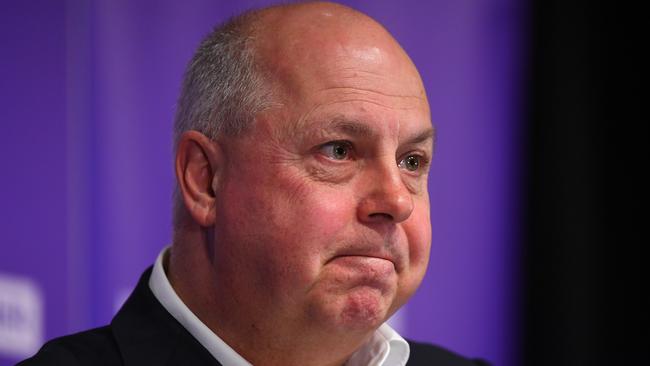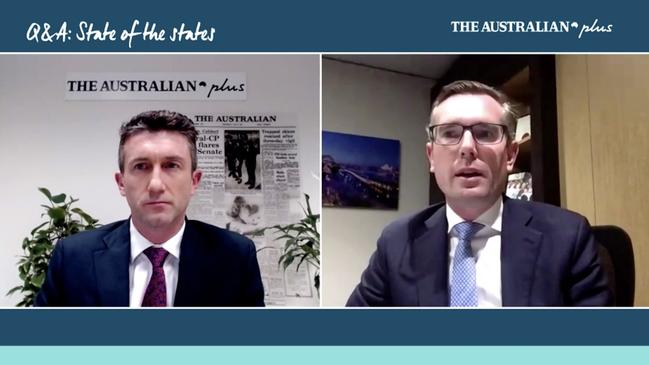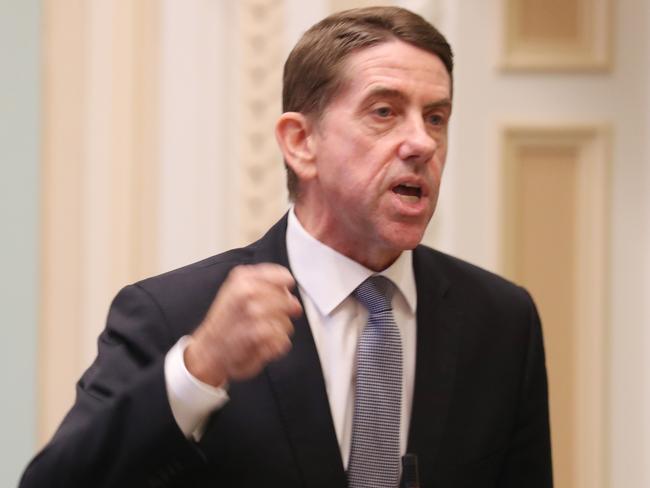Damage from Victoria’s second wave unclear for weeks: Treasurer Tim Pallas
The economic and health effects of Victoria’s second wave and the return to a stage three lockdown will not be evident ‘for weeks’, state Treasurer Tim Pallas says.

The economic and health effects of Victoria’s second wave of COVID-19 and the return to a stage three lockdown will not be evident “for weeks”, state Treasurer Tim Pallas says.
“It would be true to say the government has yet to see an improvement in the numbers and that is a continuing concern,” Mr Pallas told The Australian’s exclusive online event State of the States on Tuesday night.
“Ultimately we have a responsibility to bring these numbers down.
“Our strategy is to suppress the virus and ensure the presentation of the virus is manageable in our hospital system.”
The country made a “conscious decision” not to pursue an eradication strategy but that COVID-19 cases in Victoria were “far too large”, Mr Pallas added.
Economic forecasting was not as “pessimistic” amid the second the lockdown compared to the first, he said.
“The social distancing and stage three measure reflect about a 12.5 per cent reduction in terms of economic activity.”
He said Victoria was “working very hard” to make sure harsher lockdowns were not needed.
“If you go into a broader stage 5, which is essentially shutting down all but the most essential economic activity, like New Zealand did in effect, you’re looking at something like a 25 per cent reduction in GDP.”

NSW focused on opening economy
NSW treasurer Dominic Perrottet said his state would do “everything” in its power not to move to a harsh lockdown like Victoria even if case numbers spike.
“Our clear focus from the outset has been investing a substantial amount in the health system,” Mr Perrottet said.
“The challenge is: there doesn’t appear to be substantive evidence the virus will go away anytime soon.
“Our focus is: how do we open up as much of the economy and have it operate alongside the virus as much as possible.”
He said it was “very difficult” to forecast the true economic impacts of the pandemic, but estimates in NSW revealed that if they moved to a lockdown like Victoria it would cost $1bn per week.
The NSW Treasurer said he was more focused on the economy than the budget, which was why the NSW government invested $15bn in stimulus packages.
“We came into this pandemic with a negative net debt in our state,” he said.
“We made a conscious decision to maintain an infrastructure pipeline.
“This investment has added half a percentage point each to the economy each year, but it has also substantially increased jobs.”
Opportunity for tax reform
Mr Perrottet said tax reform was “invariably hard” but the coronavirus pandemic presented an opportunity to drive an ambitious agenda.
Mr Perrottet — who has advocated for a swap of stamp duty for a broader based land tax regime — said Australia “relies on inefficient” taxes.
“We need a tax mix we can have at a state and country level that drives economic activity,” he said. “I want to see taxes lower but also smarter.”
Mr Perrottet commissioned a review into the NSW revenue system and “its interactions with the state tax system” in August last year.
A draft report released this month found “a broad-based land tax is more efficient and equitable than transfer duty”.
Queensland Treasurer Cameron Dick said the states and territories could not make any progress on tax reform unless the commonwealth took a “significant” leadership role.
Mr Dick praised his state’s property tax values and said it costs residents to live in Queensland less than NSW (they pay $1000 less) and Victoria (they pay $700 less).
Mr Pallas said the Victorian state government had yet to make any “considered” decisions on abolishing stamp duty.
“We need reform but in partnership with other states,” he said. “I am not ruling in or out any particular area of reform.”
He noted Victoria had reduced stamp duty liability for first home owners and doubled the value of grants in regional areas.
Queensland will put ‘our citizens first’ in border moves
Mr Dick said he “hoped” his state would not move to close the border, but authorities would be informed by a “health response”.
“We are moving to a good place now with NSW,” Mr Dick said. “We will put the health of our citizens first as we go forward.”

On tourism Mr Dick said it was his “vision” to encourage local visitors to visit the state as much as possible to kickstart the economy.
“Australians do spend a significant amount of money overseas,” he said. “Our vision is that we can capture that for our state.”
While they acknowledged effective co-operation between states and territories throughout the COVID-19 pandemic, Mr Dick and Mr Perrottet differed to the Victorian Treasurer’s position on China’s Belt and Road initiative.
“It’s not on our horizon at the moment,” Mr Dick said.
Mr Pallas insisted the controversial initiative Victoria signed up to in 2018 — designed to create maritime trade routes and invest in infrastructure projects across the globe — was about trade and tourism.
“It’s about mutual respect and working together around areas of common interest,” he said.
“One of the obvious things is China is now Victoria’s number one trading partner and market for tourism. It is of profound economic significance”.
He said it was not a question of “choosing between China or anybody else”, but recognising the opportunities for trade and jobs.
Take part in the event hosted by The Australian’s Adam Creighton here




To join the conversation, please log in. Don't have an account? Register
Join the conversation, you are commenting as Logout